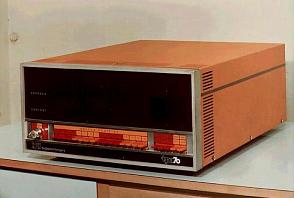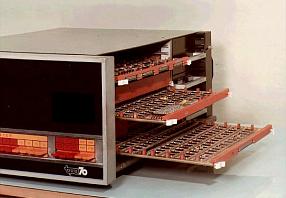"The TPA-70 small computer system consists of different processors with different speed and computing capacity, core and semiconductor memory, mass storage units and a high number of peripherals. The TPA-70 is a 16-bit general-purpose minicomputer, which are built from highly reliable integrated circuit." (TPA-70 System Modules Handbook, 1979.)
The TPA-70 project started around 1970/71. Its main goal was to build a "better-than-the-PDP11" 16-bit computer, a fully original design. The engineering was cancelled around 1976, the designers went on to build a PDP-11/40 "clone", the TPA-1140.
The machine's main bus was the MIOBUS (Memory Input-Output BUS) with a throughput of 32 Mbit/sec. There were two types of sub-busses connected to it: the SIOBUS (Small Input-Output BUS, for paper tape puncher/readers and other small storage systems) and the DIOBUS (Direct Input-Output BUS).
Some specs:
- 70-1025 CPU:
- Operating systems:
- Programnyelvek:
16-bit word length, 64KB addressing range, hardware stack operations, byte/word/doubleword operands, memory protection, programable real-time clock
11 registers: 4 accumulators, PC, link address register, program status register, memory protection register, error register, real-time clock register, switch register
MINOR: la papertape-based system
MINOR/D: disk (cartridge/fix-headed/floppy) operating system
DOST: a disk operating system for the SZTAKI graphical system
RTE: real-time executive
SALT-70: Symbolic Assembly Language
FORTRAN: editor, linker and debugger for ANSI FORTRAN IV
BASIC-70: multiuser interpreter enviroment, that replaces the OSs
Som interesting bits: Control Data Corporation (CDC) has bought two TPA-70 systems around 1976/77, both have been delivered to the US! Unfortunately I don't know what happened with those machines...

